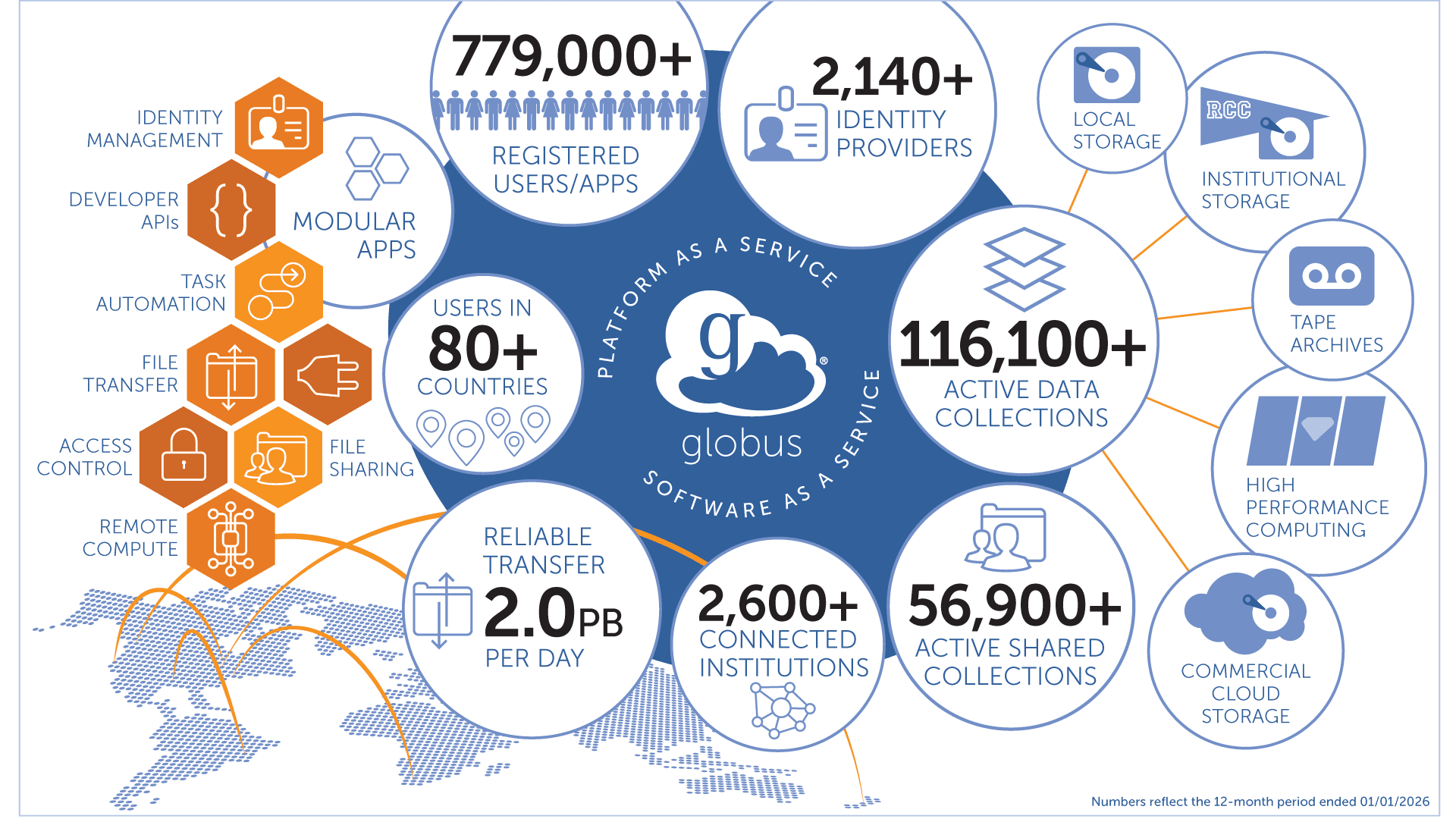What We Do
Globus is research cyberinfrastructure, developed and operated as a not-for-profit service by the University of Chicago.

With Globus, you can easily, reliably and securely move, share, & discover data no matter where it lives – from a supercomputer, lab cluster, tape archive, public cloud or laptop. Access and manage all your data, even protected data, from anywhere, using your existing identities, with just a web browser.
Note: Globus has various levels, ranging from free to different fee-based subscription service. Refer to our subscription page to see what is right for you.
Who uses Globus?
- Researchers at hundreds of universities, national labs, government facilities, and other research institutions – plus a growing number of commercial companies – use Globus routinely as they work with data
- Research computing managers and IT groups depend on Globus to make storage more accessible for their researchers, and to monitor and facilitate storage system usage
- Developers use Globus to automate data workflows and build custom web applications–such as science gateways and searchable data portals–as well as mobile, desktop, and command line applications and services.
What can I do with Globus?
- Transfer files: From kilobytes to petabytes, with Globus you can efficiently, reliably, and securely move data between systems within your site or across an ocean.
- Share files with others: All you need is an email address to share data with colleagues – Globus manages authentication and access
- Automate data handling: Use the scheduling tool to transfer data on a regular basis or with Globus Flows design and execute secure, reliable automated data flows at scale.
- Compute from anywhere: The Globus Compute platform enables you to execute functions on diverse remote systems, from laptops to campus clusters, clouds, and supercomputers.
- Develop applications and gateways: Our open REST APIs and Python SDK empower you to create an integrated ecosystem of research data services, applications, and workflows.
- Reduce the barriers associated with AI research, development, and deployment: Easily manage large training datasets, deploy large-scale training campaigns across diverse computing resources, and construct robust workflows that automate sophisticated AI processes from data acquisition to model deployment.
Why should I care?
- Globus makes it much easier to work with data, while ensuring security and reliability.
- Researchers can worry less about moving and sharing data and can focus more on their research
- With Globus researchers can automate routine as well as complex multi-step data handling tasks
Globus is supported by an expert team with decades of research data management experience, so users have first-rate support plus access to professional services for custom projects.
How do I get started?
With a low-cost subscription (kept affordable thanks to our community of subscribers) any organization can provide comprehensive data management capabilities to their entire team. Users can also get started today with file transfer – just log in and start moving data.
Related Content
Data Transfer With Globus
Why Use Globus? Globus is a fast, secure, and reliable way to move MB’s, TB’s and even PB’s of data....
Research Automation
The automation of data handling has become increasingly important for today’s researcher. Globus addresses this need in a variety of...
Computing with Globus
Globus offers a distributed Function as a Service (FaaS) platform that enables reliable, scalable, and high performance remote function execution....
Data Publication and Discovery
Federal mandates and research reproducibility pressures make it imperative that data are properly catalogued and easily searchable by partners, collaborators,...
Enabling AI and ML
Machine learning (ML) and artificial intelligence (AI) are now critical tools for almost every research discipline. These methods are pushing...
Data Sharing With Globus
Why Use Globus to Share Data? As a researcher: Share data with anyone in your institution, or in other institutions...